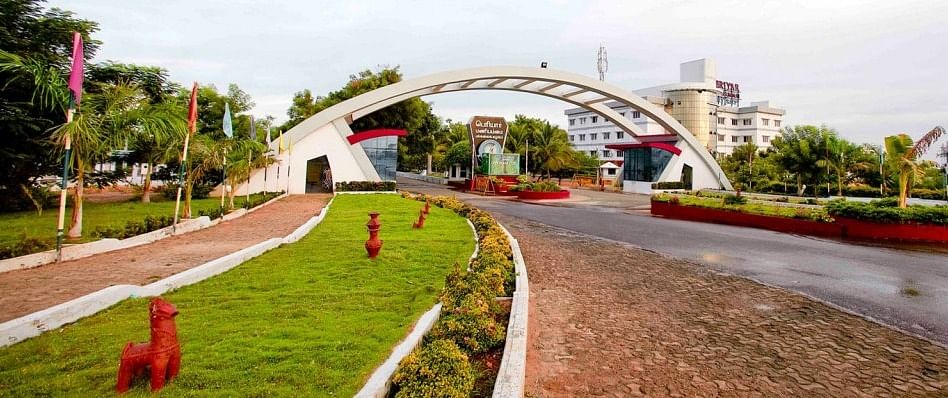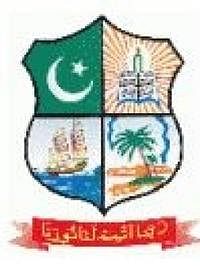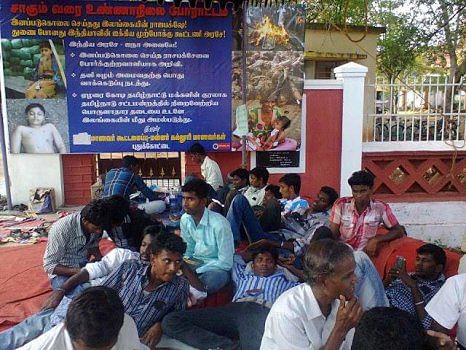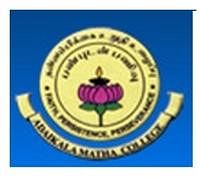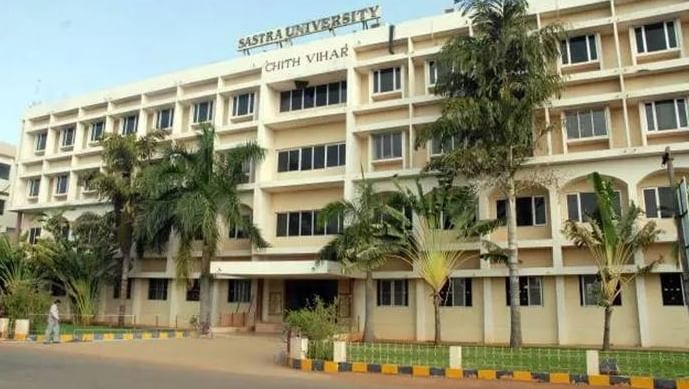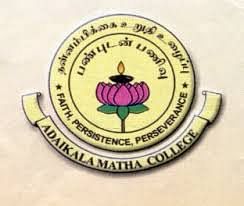Knowledge and intelligence distinguish humans from other living beings. While intelligence is innate, knowledge is acquired and cultivated through academic institutions, commonly known as universities. India’s tradition of organized learning dates back to the Pallava era with a Sanskrit college and the renowned Nalanda University in the north. The 19th century saw the establishment of prominent universities like Madras, Bombay, and Calcutta during British rule. Even earlier, Tamil’s development was nurtured through the ancient Chankam (Assembly of Poets), underscoring India’s rich academic heritage.
Tamil, a classical language with profound literature, remained overshadowed during British rule. This neglect inspired Tamil scholars to propose a Tamil University in Thanjavur on August 23, 1925. Despite initial efforts, the plan stalled due to insufficient government support. Decades later, in 1981, the vision was realized with the Tamil Nadu State Assembly passing the Tamil University Act, and the university was officially recognized by the UGC in 1983.
Dedicated to Tamilology, the university initially focused on research in linguistics, translation, lexicography, music, drama, and manuscriptology. M.Phil and Ph.D. programs were introduced in 1992, and postgraduate courses were added in 2003 due to public demand.
Tamil University, [TU] Thanjavur Quick Links:
| Attribute | Details |
|---|---|
| Name | Tamil University |
| Established | 1981 |
| Location | Thanjavur, Tamil Nadu (Campus: 850 acres) |
| Vision | To preserve, study, and advance Tamil language, culture, and scientific heritage. |
| Mission | Excellence in Tamil studies, literature, and cultural research; support societal benefit and innovation. |
| Academic Structure | Five faculties: Arts, Manuscriptology, Developing Tamil, Language, and Science |
| Major Departments | Sculpture, Music, Drama, Manuscript Studies, Linguistics, Literature, Siddha Medicine, Architecture, etc. |
| Programs Offered | B.A., B.Sc., M.A., M.Sc., M.Phil, Ph.D., and diploma courses (focus on Tamil and allied fields) |
| Research Focus | Tamil language, culture, archaeology, literature, and scientific advancements. |
| Publications | Over 500 books; Encyclopedias (Science: 17 vols, Humanities: 17 vols); Greater Tamil Lexicon, dictionaries. |
| Facilities | Library (170,000 books), herbal garden, Karikalan Arangam (1,000 seats), hostels, gym, eco-friendly campus. |
| Affiliations | International Institute of Tamil Studies (Chennai), Pondicherry Institute of Linguistics and Culture |
| Special Initiatives | - Tamil coaching for IAS/IPS officers |
| - NRI training on Tamil language and culture | |
| - Public exhibitions | |
| Extension Activities | NSS programs, medical camps, disaster management awareness, yoga training, rural adoption (Neelagiri Vattam). |
| Student Support | Coaching for UGC NET, IAS; scholarships for SC/ST/BC students; 55 endowments for lectures and fellowships. |
| Awards and Recognitions | Karikalan Award for Foreign Tamil Literature; MoUs with international and national research institutions. |
| Core Values | Research, cultural preservation, public outreach, and empowerment of rural and socio-economically weak groups. |
| Infrastructure | Open-air theatre, distance education center, performing arts center, modern gym, residential quarters. |
| Notable Achievements | Discoveries in Tamil Brahmi inscriptions; excavations of archaeological sites; leading nodal center in research. |
| Placement and Career Support | Research-focused, empowering rural students for higher education and academic careers. |
| Official Website | https://www.tamiluniversity.ac.in/english/arial-roots-2/campus-map-2/ |
Tamil University, [TU] Thanjavur Courses:
With a total of 36 courses offered atTamil university, the college offers education in the field of phd , Art& science, diploma& certification & Distance education among other streams to the students. Students can check out the below table to understand the eligibility requirements and total tuition fee for all Tamil university courses:
| Course | Fees | Eligibility |
|---|---|---|
| Ph.D(8 Courses) | ₹25,700 - 30,700 (1st Year Fees) | Post Graduation |
| MA (9 Courses) | ₹8,850 (1st Year Fees) | Graduation |
| Diploma(4 Courses) | ₹1,000 (Total Fees) | - |
| M.Sc(2 Courses) | ₹10,850 (1st Year Fees) | Graduation |
| PG Diploma(4 Courses) | ₹2,000 - 5,000 (Total Fees) | Graduation |
| Certification(3 Courses) | ₹600 (Total Fees) | - |
| M.Phil(6 Courses) | ₹6,800 - 7,800 (1st Year Fees) | Post Graduation |
| MBA(8 Courses) Distance Education | ₹11,900 (1st Year Fees) | Graduation |
Tamil University, [TU] Thanjavur Departments:
- Sculpture
- Music
- Drama
- Palmleaf Manuscripts
- Rare Paper Manuscripts
- Epigraphy And Archaeology
- Maritime History and Marine Archaeology
- Tamil Studies in Foreign Countries
- Translation
- Lexicography
- Social Sciences
- Scientific Tamil and Tamil Development
- Education and Management
- Literature
- Linguistics
- Philosophy
- Tribal Research
- Folklore
- School of Indian Languages & Comparative Literature
- Siddha Medicine
- Ancient Science
- Industries and Earth Sciences
- Architecture
- Computer Science
- Environmental and Herbal Science
- Library and Information Science
Tamil University, [TU] Thanjavur Committees:
- Research Committee
- Purchase Committee
- Building Committee
- Women's Welfare Committee
- Finance Committee
- Publication Committee
- IQAC Committee
- NAAC Committee
Tamil University, [TU] Thanjavur Infrastructure Facilities:
- Tamil University has a Faculty Guesthouse for research scholars along with well-equipped college atmosphere.
- There is an Open Ait Theatre at the Tamil University for various cultural activities to take place.
- Along with computers for each department, there is an Internet Centre at the Tamil University with high-speed internet for research purpose and can be used by students or faculty.
- The Library at the Tamil University is one of the largest and oldest in the state with nearly 1,70,000 books and many other journals for research and other needs.
- The Digital Library is an addition to the facilities provided which contains E-books, E-journals, etc.
- Tamil University also has a sports cell that takes care of all the activities related to sports and encourages students to learn more about sports.
- The Museum at the Tamil University is its major attraction which has many objects of archeology and culture.
Tamil University, [TU] Thanjavur Placement Highlights:
- Tamil University has a Placement and Career Counselling Cell that helps students to have exposure to jobs that are available and guides the students.
- Career Guidance and Counselling Cell provides sufficient support for employment and personality development skills.
- The Placement Cell also organizes many workshops related to professional trends.
- It also aims to improve the social values and knowledge of students.
Tamil University, [TU] Thanjavur Eligibility Criteria:
|
Course |
Eligibility |
|
B.Ed./ BPA |
|
|
MA/ M.Sc/ MSW/ MCA/ MLIS/ M.Ed. |
|
|
M.Phil. |
|
|
Ph.D. |
|
|
Diploma |
|
|
Postgraduate Diploma [Translation] |
|
|
Postgraduate Diploma
[Herbal Bio-Technology]
|
|
|
Postgraduate Diploma [Siddha Drug Standardization] |
|
|
Postgraduate Diploma [Environmental Management] |
|
|
Certificate Courses |
|
Tamil University, [TU] Thanjavur Admissions:
Programs Offered
Undergraduate (B.Ed)
- Duration: 2 years
- Eligibility: Graduation or equivalent in a relevant field
- Selection: Merit-based
Postgraduate (MA, MBA, MSc, M.Com, MLIS)
- Duration: 2 years
- Specializations:
- MA: Tamil, History, Tamil Music, English, Bharathanatiyam, Yoga
- MSc: Geography, Environmental Science, Psychology, Maths, Botany
- MBA: Business Administration
- M.Com, MLIS
- Eligibility: Graduation in a relevant discipline
- Selection: Merit-based
Diploma Courses
- Specializations: Dance & Music, Traditional Medicine, Yoga, Herbal Science, Astrology, Temple Priesthood, Epigraphy, Public Speaking, Drawing, and more
- Eligibility: 10th/12th or equivalent certification
- Selection: Merit-based
Postgraduate Diploma
- Duration: 1 year
- Specializations: Computer Applications, Guidance & Counselling, Yoga, Web Services
- Eligibility: Graduation in a relevant field
- Selection: Merit-based
Application Process
- Purchase the application form from the university.
- Submit the completed form with necessary documents: 12th-grade mark sheet, graduation mark sheet (for PG), eligibility, migration, and gap certificates (if applicable).
- Enclose a ₹250 demand draft (DD) in favor of Registrar, Tamil University or a Bank of India receipt.
Tamil University, [TU] Thanjavur Scholarship
Students are supported in accessing scholarships from the Government of Tamil Nadu and funding bodies like the UGC. Additionally, department-wise top three rank holders each year receive special scholarships funded by the Bharathiyar and ATPanneer Selvam Endowment.
Tamil University, [TU] Thanjavur Cutoffs:
- The cutoffs for different courses vary from one another.
- The cutoffs are based on a merit list prepared by the Tamil University every year.
- The merit list is calculated by taking into consideration the 10+2 marks of the candidate.
- The cutoffs will be put up in the main office of the Tamil University and the official website.
- Generally, the cutoffs range between 45% to 50%.
Tamil University Highlights
| Institution Type | Public |
| Total Area (In Acre) | 824.93 |
| Construction Area (Sq. M) | 39200.78 |
| Year of Establishment | 1981 |
| Website | www.tamiluniversity.ac.in |
Tamil University Courses and Fee Structure
Courses offered by Tamil University
M.Sc [Master of Science]
Offline On Campus- Specialization:
- Environmental Science
MA [Master of Arts]
Offline On Campus- Specialization:
- Social Science
PhD [Doctor of Philosophy]
Offline On Campus- Specialization:
- History
- Social Science
M.Phil [Master of Philosophy]
Offline On Campus- Specialization:
- Applied Linguistics
- Philosophy
Postgraduate Diploma (PGD)
Offline On CampusTamil University Infrastructure
Facilities
- Library
- Laboratory
- gym
- Cafeteria
- Computer labs
- Medical Hospital
- Hostel
- Auditorium
- Sports
Gallery View All
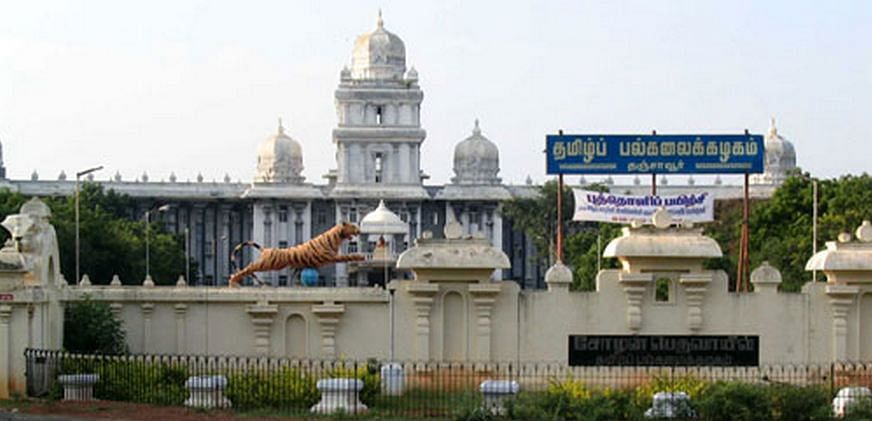
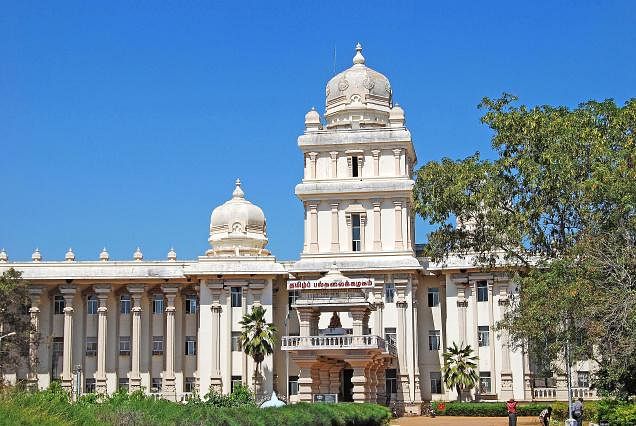
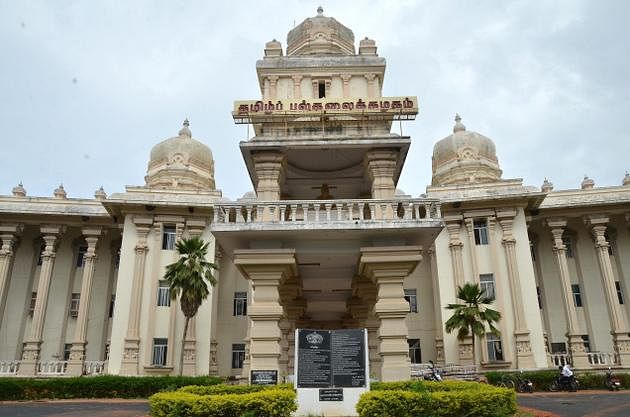
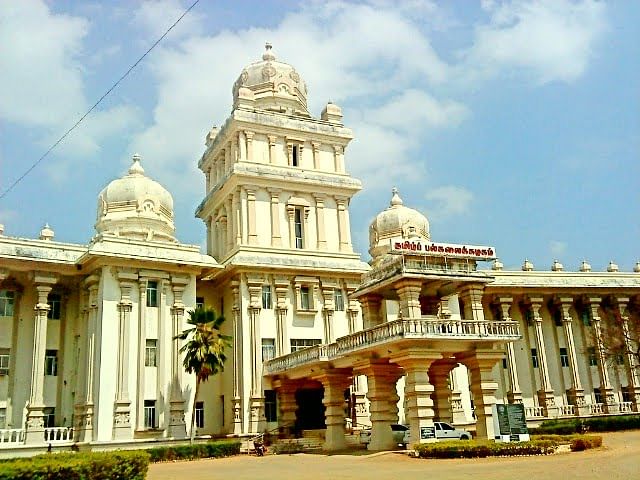
Contact Details
Contact Us
- Tamil University, [TU] Thanjavur - Trichy Road Thanjavur 613 010
- www.tamiluniversity.ac.in
![Tamil University, [TU] Thanjavur](https://media.getmyuni.com/azure/college-image/small/tamil-university-tu-thanjavur.jpg)


